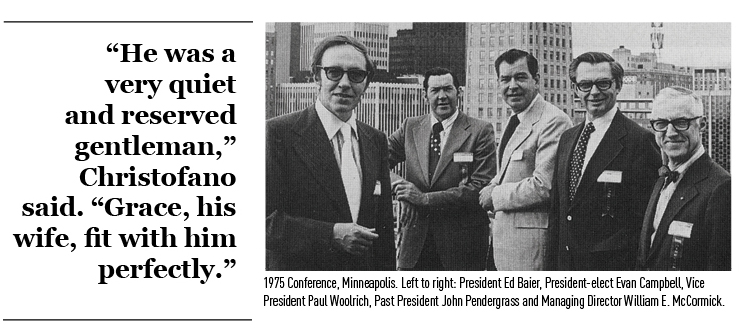Edward J. Baier, AIHA’s thirty-seventh president and the namesake for one of the association’s most prestigious awards, passed away Dec. 13, 2014, in Frederick, Md. He was 89.
A graduate of the School of Public Health at the University of Pittsburgh, Baier began his distinguished career as an industrial hygienist with the Pennsylvania Department of Health in 1946. From 1956 through 1972 he led the state Division of Occupational Health and Bureau of Mine and Health Safety in Harrisburg. In 1972 he joined the federal government as the first deputy director of NIOSH. Following a brief stint as manager and corporate director of industrial hygiene with Diamond Shamrock Corp., Baier returned to public service as director of Technical Service for OSHA, a position he held until his retirement in 1989.
During his career, Baier authored more than 130 technical papers. He was active in many professional societies and served as AIHA president in 1975–76. He attained the rank of AIHA Fellow, received AIHA’s Donald E. Cummings Award for outstanding contributions to industrial hygiene in 1982, and was later named an honorary member of AIHA.
In 1984, AIHA established the Edward J. Baier Technical Achievement Award to commemorate Baier’s leadership and stature in industrial hygiene. The award honors individuals and organizations that have made significant contributions to industrial hygiene through technical expertise, technological innovations, scientific advancements, and interaction with or influence on other scientific disciplines. Baier himself was selected as the award’s first recipient.
AIHA Past President Emil Christofano recalled Baier as a humble man widely liked and respected for his professionalism and easygoing demeanor. The two met in the late 1950s, while Baier was working for the Pennsylvania Department of Health and Christofano for the Atomic Energy Commission. Baier and Christofano collaborated on the temporary closing of a beryllium plant. When the plant reopened, its management offered Christofano a job, and he accepted. As a member of the regulated community, Christofano’s respect for Baier continued to grow.
“We had to cooperate,” Christofano said. “There was only so much you could do in the amount of time available, and he understood and we understood, and we just worked as hard as we could. We completely renovated the operation, improved the ventilation, improved the waste disposal practices—everything was pretty well cleaned up.”
Their mutual respect grew into a lasting friendship.
“He was a very quiet and reserved gentleman,” Christofano said. “Grace, his wife, fit with him perfectly.”



